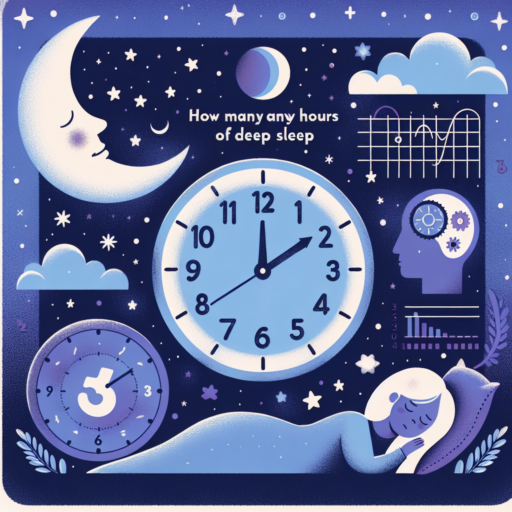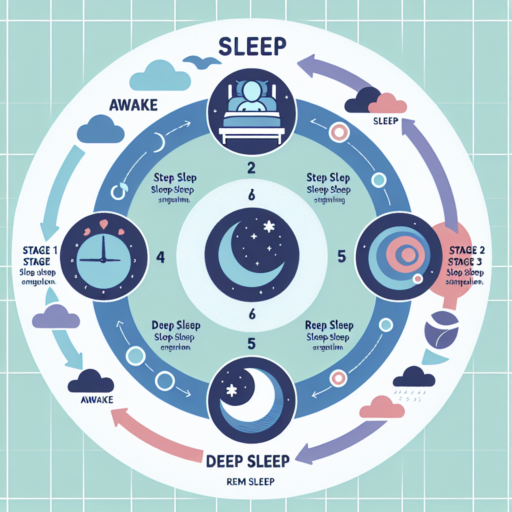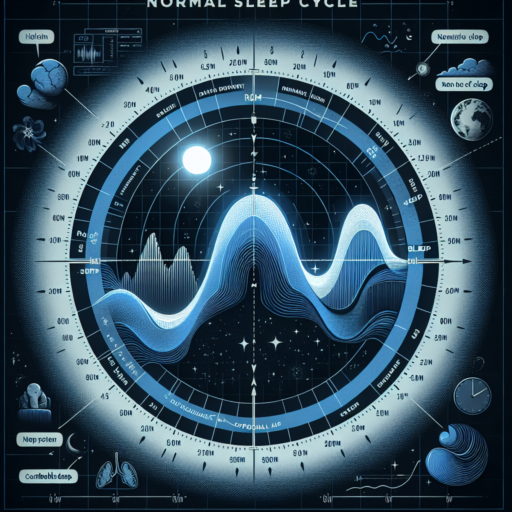Understanding Deep Sleep: What You Need to Know
Deep sleep, or slow-wave sleep, plays a crucial role in our overall health and well-being. As one of the most profound phases of the sleep cycle, it’s the period when the body and brain have the chance to rejuvenate and recover from the day’s activities. Comprehending the intricacies of deep sleep can empower you to enhance your sleep quality and, by extension, your daily life.
During deep sleep, our bodies go into a state of significant physiological repair. Processes such as cell regeneration, immune system strengthening, and energy replenishment are at their peak. This phase is also pivotal for memory consolidation, allowing for the transfer of information from short-term to long-term memory. Understanding the mechanisms behind deep sleep can shine a light on its paramount importance to cognitive functioning and overall physical health.
Several factors can influence the quality and quantity of deep sleep, including lifestyle choices and environment. Practices such as maintaining a consistent sleep schedule, optimizing your sleep environment for comfort and minimal disturbances, and avoiding stimulants before bedtime can significantly enhance deep sleep. Additionally, reducing stress through mindfulness or relaxation techniques before bed can also improve the quality of slow-wave sleep phases. Recognizing and adjusting these factors is vital for anyone looking to improve their deep sleep patterns.
How Many Hours of Deep Sleep Are Normal Each Night?
Understanding the amount of deep sleep that is considered normal each night is key to evaluating our sleep health. The National Sleep Foundation suggests that adults should aim for about 7 to 9 hours of sleep per night, but it’s not just the quantity that matters — the quality, specifically the amount of deep sleep, is also crucial. Deep sleep, or slow-wave sleep, constitutes approximately 13-23% of a full night’s sleep for adults. This translates to roughly 60 to 110 minutes of deep sleep per night, depending on the total amount of sleep an individual gets.
The Importance of Deep Sleep
Deep sleep plays a pivotal role in various physical and mental restoration processes. It’s during this phase that the body repairs tissues, strengthens the immune system, and builds bone and muscle. Not getting enough deep sleep can have noticeable impacts on your energy levels, mood, and overall health.
It’s noteworthy that the specific amount of deep sleep can vary significantly from one person to another. Factors such as age, lifestyle, and health conditions can affect how much deep sleep you’re getting. For instance, younger individuals typically require more deep sleep, which aids in growth and development. Conversely, the amount of deep sleep tends to decrease as one ages.
Ensuring a healthy sleep routine is beneficial for increasing the chances of achieving adequate deep sleep. This includes sticking to a consistent sleep schedule, optimizing your sleep environment for comfort and minimal disturbances, and avoiding stimulants like caffeine and electronic devices before bedtime. While the exact amount of deep sleep needed can vary, striving for a good quality overall sleep schedule is a solid step towards better health and well-being.
The Importance of Deep Sleep for Your Health
Deep sleep, often referred to as slow-wave sleep, plays a pivotal role in the overall wellness of an individual. During this stage of sleep, the body undergoes a series of essential regenerative processes that are crucial for physical and mental health. This restorative phase helps in repairing muscles, consolidating memories, and regulating hormones that control growth and appetite.
Enhancing Mental Well-being
One of the most significant benefits of deep sleep is its impact on mental health. It is during this phase that the brain eliminates toxins that can lead to cognitive decline. Furthermore, deep sleep strengthens neural connections, which enhances memory retention and learning capabilities. Lack of adequate deep sleep, on the other hand, is linked with increased anxiety, mood swings, and susceptibility to stress.
Boosting Immune Function
The role of deep sleep in strengthening the immune system is another aspect that underscores its importance. This sleep phase allows the body to effectively fight off infections by optimizing the deployment of cytokines, a type of protein that targets infection and inflammation. Individuals who consistently reach this stage of sleep are less likely to fall sick frequently, showcasing the direct correlation between deep sleep and a robust immune response.
Factors That Influence Your Deep Sleep Duration
Certainly! Below is a succinct piece optimized for SEO, centering on the provided H2 topic:
Deep sleep, a critical phase of our sleep cycle, is influenced by a variety of factors. Understanding these can help improve the quality and duration of this restorative sleep stage. Deep sleep is pivotal for physical recovery, memory consolidation, and regulating emotions. Thus, key elements affecting its duration warrant attention.
Lifestyle Choices
Your daily actions and habits play a significant role in determining how much deep sleep you get. Factors such as exercise routines, dietary choices, and alcohol consumption can notably influence the quality and quantity of deep sleep. Regular physical activity and a balanced diet are conducive to improved sleep patterns, while excessive alcohol and caffeine intake, especially closer to bedtime, can disrupt them.
Sleep Environment
The environment in which you sleep is equally critical. Factors such as ambient temperature, noise levels, and light exposure significantly affect your ability to fall into deep sleep. An ideal sleep environment is cool, quiet, and dark. Ensuring your sleeping area is conducive to such conditions can markedly enhance the depth and duration of your sleep.
Stress and Mental Health
Stress and mental health issues are also key players in determining your deep sleep duration. High levels of stress or conditions such as anxiety and depression can severely interrupt sleep patterns, reducing the time spent in deep sleep stages. Incorporating stress-reduction techniques such as meditation, yoga, or deep breathing exercises before bedtime can help improve sleep quality.
No se han encontrado productos.
How to Track Your Deep Sleep Hours
Tracking your deep sleep hours is essential for understanding and improving your sleep quality. Deep sleep, or slow-wave sleep, is the most restorative sleep stage, helping with memory consolidation, immune system function, and overall health. Fortunately, there are several ways to monitor this crucial sleep phase.
Using Sleep Trackers and Smartwatches
One of the most convenient methods to measure deep sleep hours is through the use of wearable devices like sleep trackers and smartwatches. Many of these devices come equipped with sensors and algorithms designed to monitor sleep patterns, including deep sleep. They often provide detailed reports that help users understand their sleep quality, including the amount of time spent in each sleep stage.
Mobile Apps for Sleep Monitoring
Alongside wearable devices, numerous mobile applications are available that can help track your sleep stages, including deep sleep. These apps typically work by analyzing your movement and sound during sleep, using your smartphone’s accelerometer and microphone. While not as accurate as wearables, they are a good starting point for anyone interested in monitoring their sleep patterns.
Professional Sleep Studies
For those seeking the most accurate analysis of their sleep, professional sleep studies, or polysomnography, offer comprehensive monitoring. Conducted in specialized sleep clinics, these studies can provide in-depth insights into your sleep stages, including detailed metrics on deep sleep. This method is particularly beneficial for individuals with sleep disorders or unexplained fatigue.
Improving Your Deep Sleep: Tips and Tricks
Deep sleep is essential for our health and well-being, acting as a foundational component for cognitive function, physical recovery, and emotional stability. To enhance the quality of your deep sleep, several evidence-based strategies can be beneficial. Let’s delve into some effective tips and tricks that could transform your sleep quality, helping you wake up refreshed and recharged each morning.
Create a Restful Sleeping Environment
One of the most critical aspects of improving deep sleep is to ensure that your sleeping environment supports uninterrupted rest. This includes maintaining a comfortable room temperature, ideally between 60-67 degrees Fahrenheit, and minimizing noise and light pollution. Utilizing blackout curtains or a white noise machine can significantly contribute to a more conducive sleep setting. Additionally, investing in a comfortable, supportive mattress and pillows can make a vast difference in achieving deeper sleep cycles.
Establish a Pre-Sleep Routine
Developing a consistent pre-sleep routine is crucial for signaling to your body that it’s time to wind down. This can include activities such as reading a book, practicing light yoga or meditation, or taking a warm bath. Limiting exposure to screens and electronic devices at least an hour before bedtime is also essential, as the blue light emitted can interfere with the production of melatonin, a hormone that regulates sleep.
Integrating these strategies into your lifestyle can markedly improve the quality of your deep sleep. Remember, consistency is key. Giving your body time to adjust to these changes will gradually enhance your sleep depth and quality, leading to improved overall health and well-being.
Deep Sleep vs. REM Sleep: What’s the Difference?
Understanding the distinctions between deep sleep and REM sleep is essential for recognizing how they contribute to our overall sleep quality. Deep sleep, also known as slow-wave sleep, is the third stage in the sleep cycle and is characterized by slow brain waves named delta waves. During this stage, our body enters a state of deep relaxation; muscle activity decreases, and it becomes harder to wake someone up. This phase is crucial for physical recovery, immune system fortification, and energy replenishment.
REM sleep, or Rapid Eye Movement sleep, on the other hand, is most notable for the quick, random movement of the eyes. This stage usually begins about 90 minutes after falling asleep and is where most dreaming occurs. The brain is more active compared to deep sleep, showing patterns similar to those during wakefulness. REM sleep is believed to be essential for cognitive functions such as memory consolidation, learning, and emotional processing.
The cycle between deep sleep and REM sleep plays a pivotal role in providing a restorative sleep experience. Initially, as the night progresses, cycles favor deep sleep, lengthening its duration. As morning approaches, REM sleep periods extend, constituting a larger portion of the sleep cycle. This balance ensures that both the body and mind are rejuvenated. Understanding these differences highlights the importance of achieving a healthy sleep cycle, as it directly impacts our physical well-being and mental sharpness.
Common Misconceptions About Deep Sleep and Sleep Cycles
When discussing deep sleep and sleep cycles, numerous myths often cloud our understanding, making it challenging to grasp what truly benefits our slumber. One prevalent misconception is that the amount of deep sleep one can achieve in a night is fixed. However, several factors, including stress levels, lifestyle choices, and environmental conditions, can significantly influence the length and quality of deep sleep.
Moreover, another common misunderstanding is equating long sleep duration with high-quality sleep. It’s crucial to distinguish between quantity and quality. Just because someone spends more hours in bed does not guarantee they are enjoying rejuvenative deep sleep or completing multiple beneficial sleep cycles. An optimal mix of both deep and REM sleep is essential for a restorative night’s rest, not merely the total hours spent asleep.
Lastly, the belief that everyone needs the same amount of sleep fosters numerous misjudgments about personal sleep needs. Individual requirements vary greatly, and they change across different life stages. Hence, adhering rigidly to the oft-quoted eight-hour sleep rule may not suit everyone, emphasizing the importance of understanding one’s unique sleep patterns and cycles.
When to See a Doctor About Your Deep Sleep Patterns
Understanding your deep sleep patterns is crucial for maintaining optimal health and well-being. Deep sleep, or slow-wave sleep, is the stage of sleep that helps rejuvenate your body, solidifying memory, and restoring energy. While variations in sleep patterns are normal, certain signs warrant a visit to a healthcare professional. In this context, identifying when to seek medical advice becomes essential.
Signs You Should Not Ignore
- Difficulty falling or staying asleep consistently over a period of time
- Frequent awakenings during the night
- Experiencing extreme fatigue or sleepiness during the day
- Loud snoring, gasping, or choking sounds during sleep
- Unexplained mood changes or increased irritability
If you notice these issues persisting, it might indicate an underlying health condition affecting your deep sleep cycles. Conditions such as sleep apnea, insomnia, or even stress and anxiety can significantly impact the quality of your deep sleep. Proactively addressing these signs by consulting with a healthcare provider can help diagnose and treat any underlying conditions, improving your overall sleep quality and health.
Understanding the Importance of Deep Sleep
Deep sleep plays a pivotal role in your health, aiding in everything from memory consolidation to the rejuvenation of your body’s cells. It’s during this phase that the body repairs muscle, organs, and other cells, ensuring you wake up feeling refreshed and rejuvenated. Knowing when to consult a doctor about your deep sleep patterns can make a significant difference in your physical and mental health, leading to a more energetic and fulfilling life.




